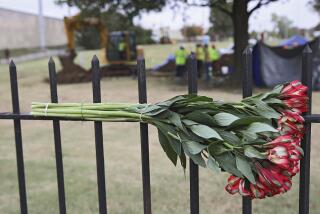Dr. John Visher dies at 88; psychiatrist co-founded stepfamilies group
Dr. John Visher, a California psychiatrist whose struggle with remarriage issues led him to co-found a national organization to advocate for stepfamilies, died April 17 at his home in the Bay Area city of Walnut Creek. He was 88.
Visher had pancreatic cancer and died of a stroke, according to his daughter, Mary Visher.
With his psychologist wife Emily, Visher launched the Stepfamily Assn. of America in 1979, a time when counseling professionals and the public at large had little understanding of the challenges facing stepparents.
As the divorce rate increased, the Vishers opened chapters across the country and in Canada and wrote seven books, including “How to Win as a Stepfamily” and “Old Loyalties, New Ties.”
“John and Emily Visher had their own vision that stepfamilies would be accepted, supported and successful. The cumulative result of their work is a recognizable turning point for all of us who live and love in stepfamilies,” said Margorie Engel, former president of the Stepfamily Assn. of America, which is now part of the National Stepfamily Resource Center at Auburn University in Alabama.
When the Vishers married in 1959, they each had four children, who ranged in age from 5 to 16.
As mental health professionals, they thought that they could quickly smooth out any difficulties in merging their families and that their children would automatically share their own happiness.
“We quickly learned that it wasn’t going to be ‘The Brady Bunch,’ ” John Visher told the New York Times in 1988. He and his new wife had unrealistic expectations, neglected to rethink their relationships with each child and tried to force a spirit of togetherness.
They also were dismayed by the misperceptions of others about what a stepfamily is and how it operates. A teacher once called them in for a meeting because she assumed their son was not receiving enough love. An attorney they met insisted that John could not be a stepfather unless the biological father was dead.
As the years passed, the Vishers found themselves sharing these experiences with other stepparents. In 1977, they formed the organization that two years later became the Stepfamily Assn. of America.
It eventually had 1,000 members in 28 states and Canada, with 18 chapters in California alone.
The nonprofit group offered information and support to stepfamilies and therapists. It also promoted research that illuminated the emotional pitfalls facing stepmothers, stepfathers and their children and the adjustment process they undergo.
“We often say one of the important things is, you don’t have to love your stepchildren. It’s enough at first to just tolerate or accept them,” Visher told the Los Angeles Times in 1993.
“So many people think, ‘Since he’s the son of my husband, I should love him like a biological child.’ We say therapists should give permission to clients not to love their stepchildren, or to let it come gradually.”
In 1993, Visher and his wife were honored by the American Assn. for Marriage and Family Therapy with an award for Distinguished Professional Contribution to Marriage and Family Therapy.
Visher was born in Waukesha, Wis., on March 2, 1921, and grew up in Evansville, Ind.
He earned his bachelor’s degree at Indiana University at Bloomington. After earning his medical degree at Indiana University at Indianapolis in 1944, he completed his psychiatric training at the University of Minnesota.
He moved to California in 1951 with his first wife, Peggy Anne. They were divorced in 1958.
The following year, he married Emily Philbrick, who died in 2001 at 83.
One of their children, Alan Philbrick, disappeared on a trek through the Sierra Nevada in 1962 and was presumed dead.
Besides Mary Visher, of Lafayette, Calif., his survivors include six other children: Sharon Gross of Albuquerque; Wendy Smith of Denver; Bill Visher of Watsonville, Calif.; David Philbrick and Larry Philbrick, both of Salem, Ore.; David Visher of Davis, Calif.; and 15 grandchildren.
Visher said he and Emily were able to establish good relations with all their children after a rocky start.
“The thing we’re proudest of,” he said some years ago, “is they’re happy and they’re good parents themselves.”
More to Read
Start your day right
Sign up for Essential California for the L.A. Times biggest news, features and recommendations in your inbox six days a week.
You may occasionally receive promotional content from the Los Angeles Times.







